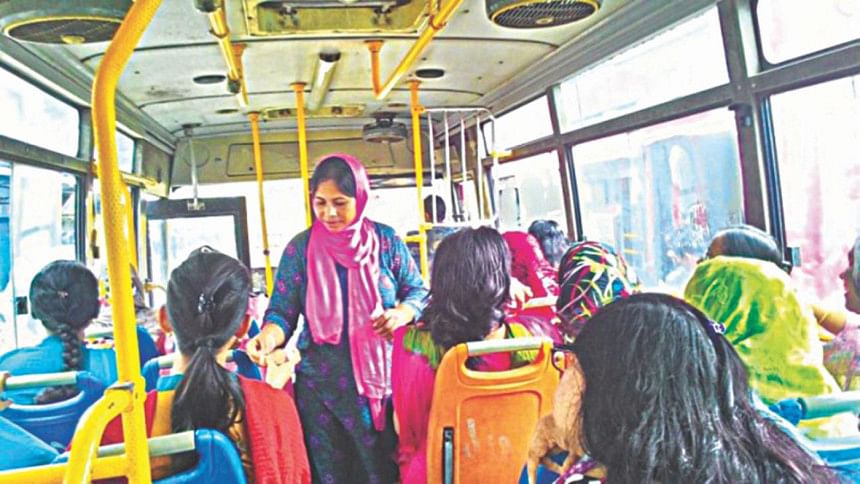Easing the plight of women commuters

The draft of the Road Transport Act 2017 received Cabinet approval last week. Due to a High Court order, it has been drafted in the light of the Motor Vehicles Ordinance 1983, but with major changes. After several recent incidents, the Bangladesh government has taken a firm stand to curb the number of road accidents. The minimum educational qualification needed to get a driver's license is now Grade 8, at least 18 years of age generally and 21 years of age for occupational drivers.
In addition to that, the draft contains other interesting provisions. The Act states that one shall be liable to three months' imprisonment and a fine of Tk 35,000 for driving motorbikes over the footpath. Another provision, also very interesting, states that if any person on a public transport sits or refuses to let others sit in the ladies' seat shall be liable to one month's imprisonment or a fine of not more than Tk 5,000 or both. Whether such a strict liability is acceptable or not is subject to debate.
Female passengers have a dedicated spot in local buses in Dhaka. In 2008 the government ordered bus owners to have nine reserved seats for women, children and persons with special needs. Generally though, such seats are reserved exclusively for women—meaning, if a man sits on a ladies' seat, the woman can ask him to vacate it for her. But in reality, it is the exact opposite. A woman's request is hardly ever accepted by a male commuter sitting in the ladies' seat although the rules are clearly written inside the bus.
The few reserved seats at the front are often occupied by men, leaving fellow women passengers standing. While many, as a form of "courtesy," offer their seat, others rarely show any sign of sympathy. The seat capacity in almost all the buses is less than the number of passengers on board. A local bus in Dhaka has roughly 44 seats, a number which is beyond the general standard. More seats mean greater sale of tickets. These seats are then customised by transport owners to make use of space so that more passengers can be availed.
Commuter buses are so crowded that it becomes impossible for older people, women or children to obtain a seat inside a bus. Consequently, these groups of people do not have access to bus services during rush hour. On top of it all, there is the risk of sexual harassment in overcrowded buses. According to a national English daily, about 62 percent of female bus passengers have said that they faced various problems or harassment while travelling by bus.
According to statistics by the Bangladesh Bureau of Statistics (BBS), as of 2015, there were about 18.3 million working women. An overwhelming number of these women travel by bus to get to work. But local buses are so crowded that it becomes impossible for these women to obtain a seat. Furthermore, the women-only buses are negligible in amount. According to the Bangladesh Road Transport Corporation (BRTC), there are only 17 women-friendly bus services which exist both in Dhaka (15) and Chittagong (2) and these are operated with a minimal number of commuters, without any profit. The existing route of the "women only bus service" covers some universities and government offices.
Dedicating seats exclusively for women is extremely important. And there are several factors as to why women need a separate seating arrangement: (i) Women travelling with babies; (ii) Sexual harassment or inappropriate physical contact inside a crowded bus; (iii) Middle-aged women often suffer from osteoporosis and arthritis; and (iv) The reserved seats are always at the front, closer to the driver's seat, so that he may attend the passenger's call for help. These are just some of the many reasons.
The question remains, is reserving seats the solution to these problems? Does a seat guarantee that a woman won't be teased or groped? The thing is though the idea of separate seats clashes with the principle of equality. The Road Transport Act 2017 emphasised the importance of ladies' seat due to the reasons mentioned above. But is imposing such a strict liability reasonable? Should a male passenger surrender his seat (willingly or unwillingly) to a woman who is as capable as him? Although these questions are something to think about, the sad reality is such that reserving seats for women in buses has become something of a necessity if women are to travel by bus with a degree of security.
The provision of the Road Transport Act 2017 was thus drafted keeping in mind the safety of women in public transports. Women in third world countries do not have access to many things that women in developed countries do. And this is all the more reason why governments in these countries should focus on making day-to-day commute for women and the elderly safer. Enactment of this Act would no doubt give way to better commuting experience for women in Bangladesh. The liability enforced may seem unreasonable to many, especially due to the jail time one has to serve just for taking up a reserved seat. But it is only expected to strengthen the government's order. It is further anticipated that such a law would instil a sense of discipline among male public transport commuters.
Aiman R Khan is an apprentice advocate at Dhaka Judge Court.





Comments